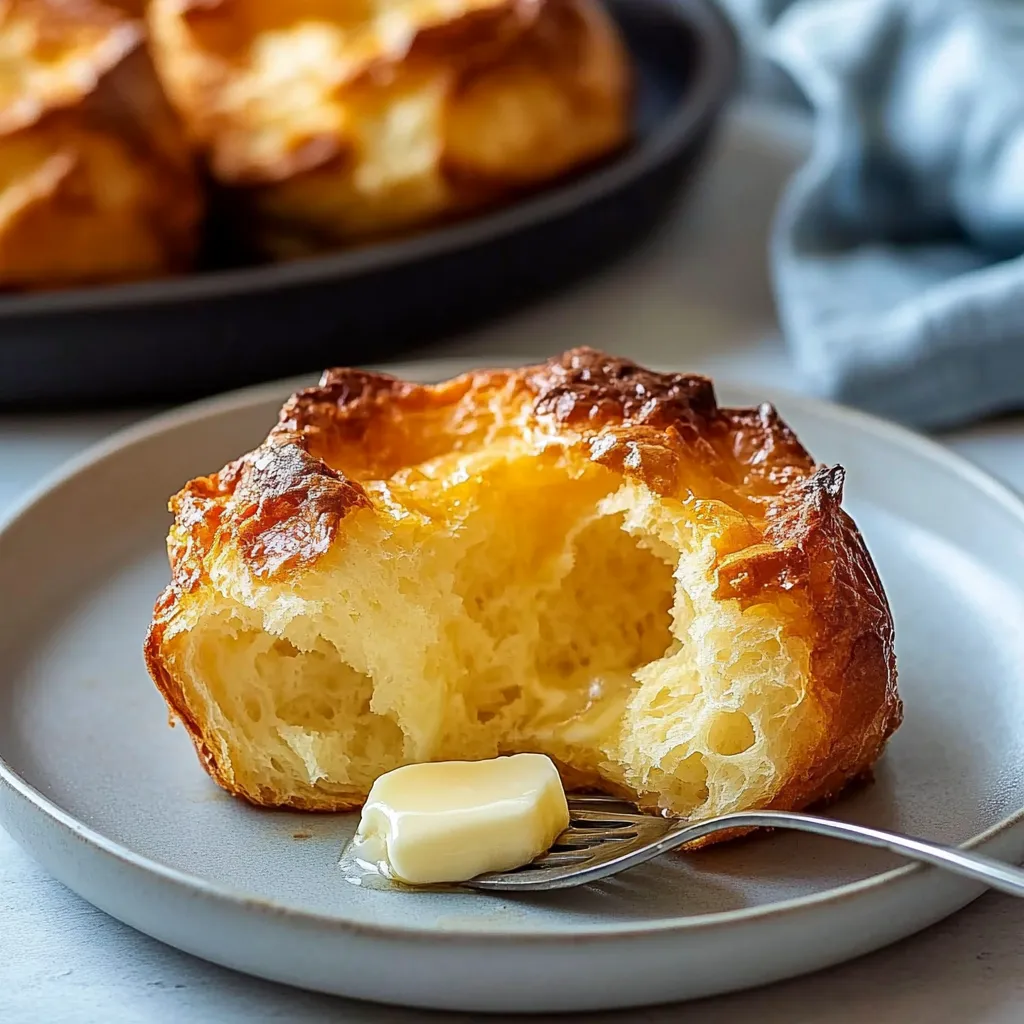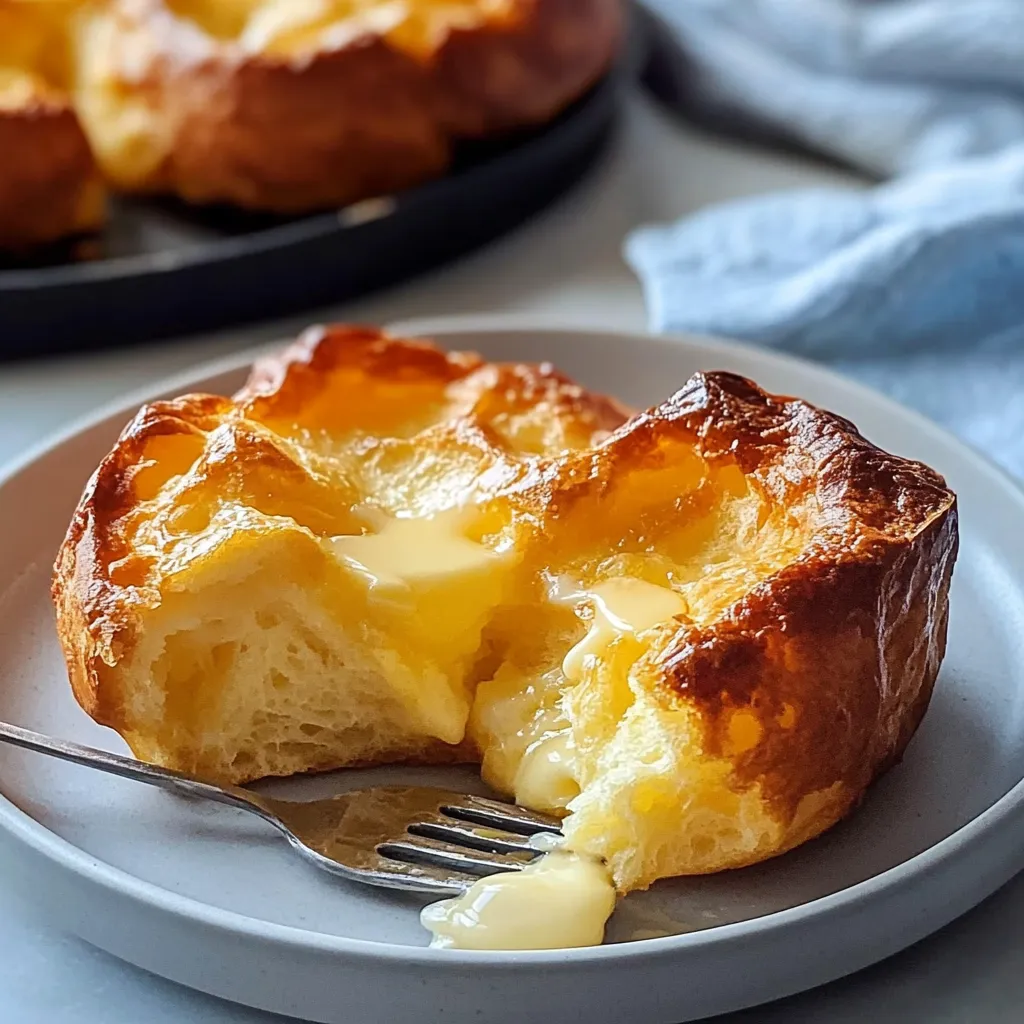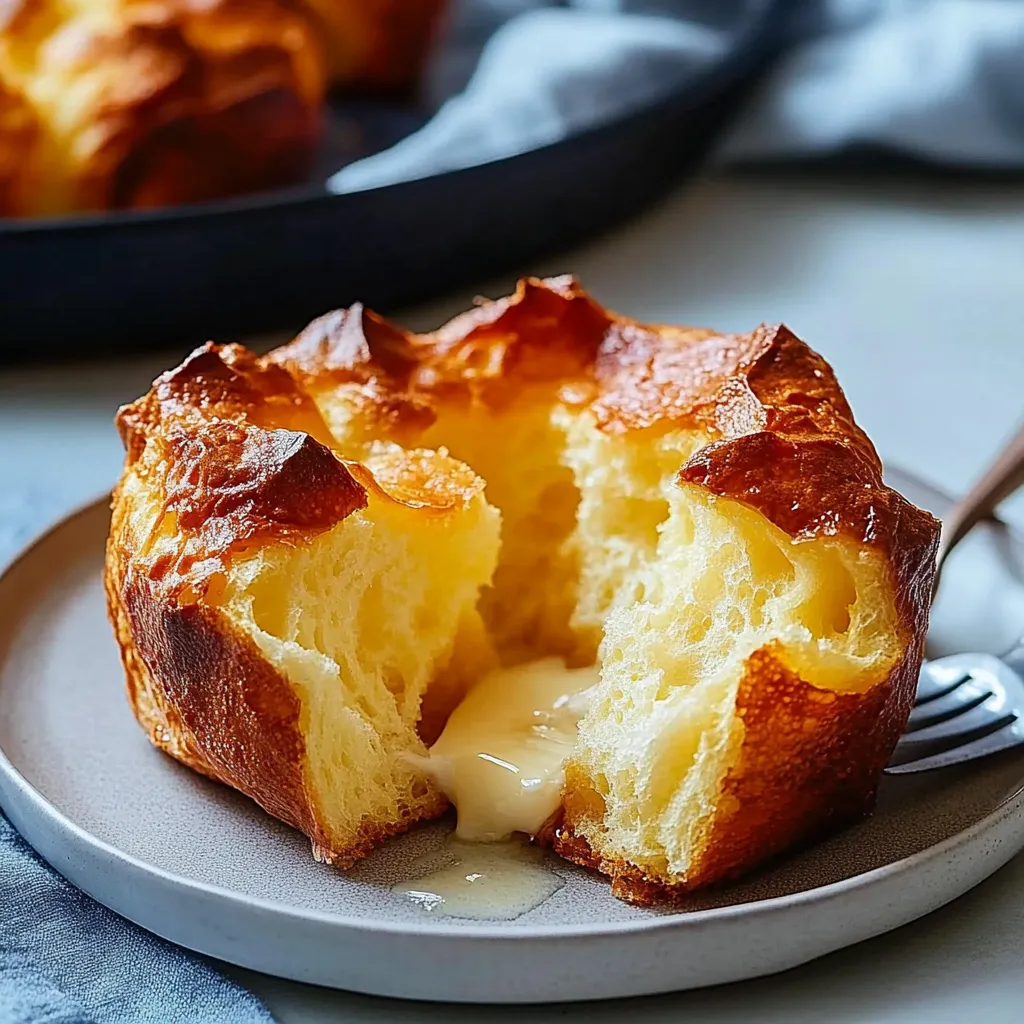 Pin it
Pin it
Easy Classic Homemade Popovers transform basic pantry ingredients into miraculous hollow cups that rise dramatically in the oven. These golden-brown treasures feature crisp exterior shells that break open to reveal airy, tender centers perfect for capturing butter, jam, or savory fillings. Despite their impressive appearance and magical rise, popovers require surprisingly little effort – just careful attention to temperature and timing to achieve their signature dramatic puff and distinctive texture.
I first learned to make popovers from my mother's handwritten recipe cards, filled with notes and secrets passed down through generations. After watching countless batches rise (or sometimes stubbornly refuse to), I've developed an almost spiritual relationship with these temperamental treats. My proudest moment came when my daughter, who typically avoids anything remotely bread-like, devoured three in one sitting and declared them "balloon bread." What surprised me most was discovering that popovers aren't just for special occasions – with practice, they become reliable enough for everyday meals while still maintaining that element of anticipation as you peer through the oven window.
Essential Elements
- Farm-fresh eggs: Provide essential structure and lift necessary for dramatic rise. Room temperature eggs incorporate better creating proper batter consistency.
- Whole milk: Contributes richness and critical moisture that creates rising steam. Full-fat varieties produce superior results compared to lower-fat alternatives.
- All-purpose flour: Forms structural framework while remaining light enough for proper expansion. Measuring precisely prevents heavy results from excess flour.
- Real butter: Creates rich flavor foundation throughout while greasing pan properly. Melted butter incorporated into batter adds depth that oil cannot match.
- Fine salt: Balances flavors while enhancing natural egg taste. Even small amount makes significant difference in final flavor profile.
- Proper pan: Conducts heat efficiently creating essential initial rise. Dedicated popover pans with deep, narrow cups create optimal height.
Baking Blueprint
- Create perfect batter:
- Blend eggs thoroughly ensuring complete incorporation of whites and yolks. Add milk gradually creating smooth liquid base. Incorporate flour and salt with minimal mixing avoiding overdevelopment of gluten. This careful technique creates ideal batter consistency that rises properly during baking.
- Prepare pan properly:
- Heat popover pan during oven preheating creating immediate steam burst essential for dramatic rise. Apply thin coating of butter throughout cups ensuring easy removal without excess fat that could weigh down rise. This critical step establishes proper environment for dramatic expansion.
- Allow proper resting:
- Let batter stand briefly allowing flour to hydrate completely. This patience-requiring step relaxes glutens preventing tough texture while maintaining structural integrity. Twenty minutes creates ideal consistency for spectacular rise.
- Master temperature control:
- Start in very hot oven creating immediate steam burst essential for dramatic rise. Reduce temperature partway through baking allowing interior to set properly without excessive browning. This temperature dance creates perfect balance between rise and texture development.
- Release steam carefully:
- Pierce tops briefly near end of baking releasing pressure that could collapse structure. This small intervention prevents soggy interiors while maintaining overall structural integrity. Timing this step properly ensures crisp exteriors with properly hollow centers.
- Serve with perfect timing:
- Present popovers immediately after removing from oven capturing optimal texture contrast. Their ephemeral perfection begins diminishing the moment they leave the oven, making prompt service essential for ideal experience.
 Pin it
Pin it
My first attempt at popovers taught me valuable lessons about patience and precision. I opened the oven door halfway through baking to check their progress, watching in horror as they instantly deflated like punctured balloons. Now I treat the oven door like a sacred boundary, refusing to open it until the final moments of baking. I've also discovered that properly heating the pan before adding batter makes a tremendous difference in the initial rise – cold pans create flat, dense results while properly heated ones launch the batter upward immediately. The most surprising discovery was how well popovers complement almost any meal – their neutral flavor profile makes them perfect companions for everything from Sunday roasts to weekday soups, elevating ordinary dinners with minimal additional effort.
Serving Suggestions
Split open while hot allowing steam to escape naturally. Fill centers with softened butter that melts instantly into interior surfaces. Consider serving alongside hearty soups creating perfect vehicle for capturing broth.
Flavor Variations
Add fresh herbs creating savory accompaniment for main courses. Incorporate aged cheese developing rich, nutty undertones throughout. Dust with cinnamon-sugar immediately after baking creating sweet breakfast variation.
Storage Solutions
Pierce bottoms immediately after baking releasing trapped steam that would otherwise create sogginess. Cool completely on wire rack before storing in paper bag maintaining crisp exterior. Reheat at 350°F for five minutes restoring original texture effectively.
The first time I served popovers to dinner guests, their expressions of delight as they pulled apart the crispy shells to discover hollow centers made all the careful preparation worthwhile. There's something almost magical about watching simple batter transform into dramatic, puffy creations through nothing more than heat, steam, and proper technique. What makes popovers truly special isn't complicated ingredients but attention to detail in preparation – respecting temperature, timing, and the physics of steam expansion creates something that feels simultaneously impressive and comforting. I've discovered they're perfect for those occasions when you want to create something memorable without considerable expense – they consistently earn enthusiastic reactions while requiring only pantry staples and careful attention.
 Pin it
Pin it
Frequently Asked Questions
- → Do I need a special popover pan?
- While a popover pan gives the best rise and shape, you can use a standard muffin tin. The popovers won't rise quite as high but will still be delicious. Fill muffin cups about 3/4 full.
- → Why do my popovers collapse?
- Opening the oven door during baking is the main cause of collapse. Other factors include not preheating the pan, cold ingredients, or underbaking. Make sure to pierce them immediately after baking to release steam.
- → Can I add flavors to this recipe?
- Absolutely! Add 1-2 tablespoons of fresh herbs (like rosemary or thyme), 1/4 cup of grated cheese, or 1/2 teaspoon of spices to the batter. Just avoid adding too much, as it can weigh down the batter.
- → Can I make the batter ahead of time?
- You can make the batter up to 2 hours ahead and let it rest at room temperature. A longer rest can actually improve the rise, but don't refrigerate it as cold batter won't rise as well.
- → Why aren't my popovers hollow inside?
- The hollow center forms from steam. Make sure your oven is fully preheated, your pan is hot, and your batter is at room temperature. Also, don't overfill the cups - about 3/4 full is perfect.
- → What can I serve with popovers?
- Popovers are versatile! Serve with butter and jam for breakfast, alongside eggs and bacon, or as a side for soups or roast dinners. They're particularly traditional with prime rib or roast beef.
